Meet these empowering Pride Champions
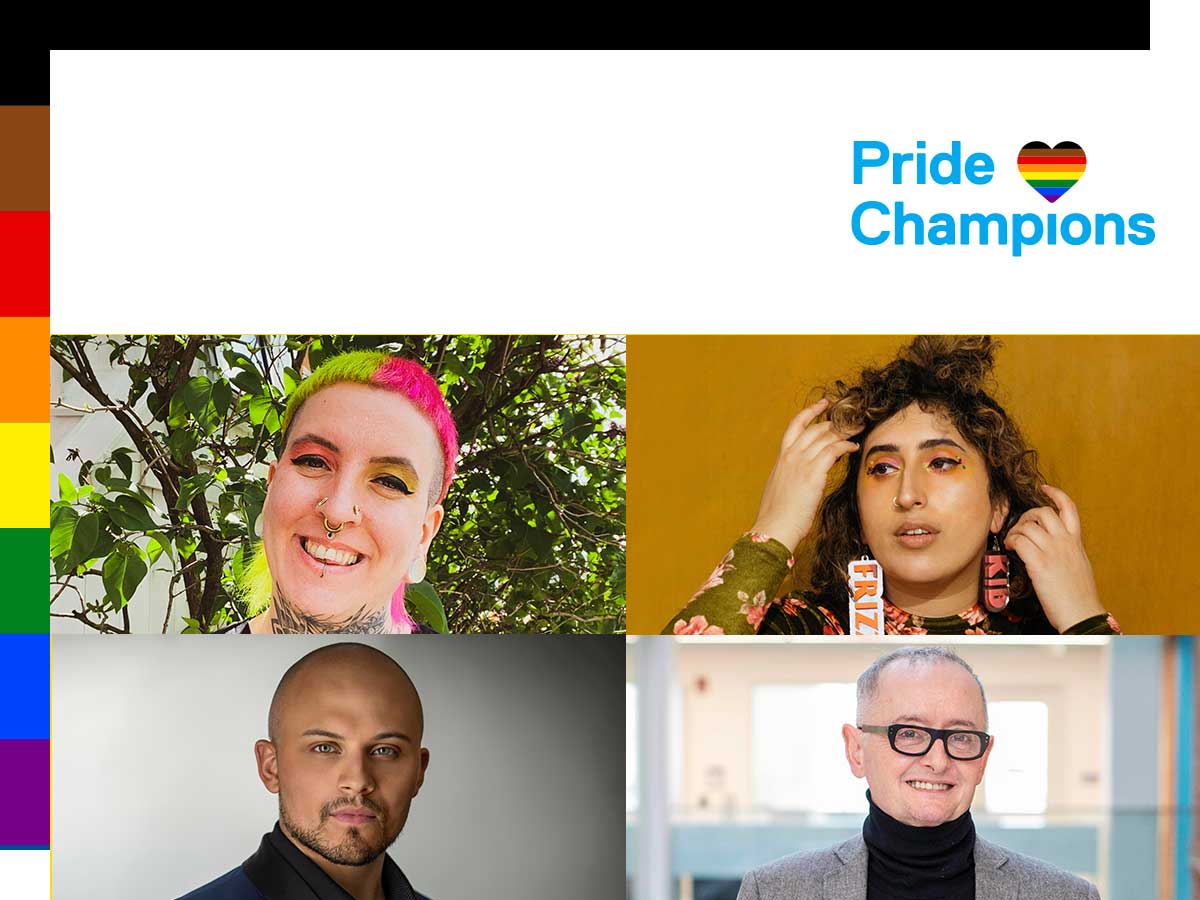
From left to right, top to bottom: Alysia Myette, Hana Shafi, Haui, Art Blake
Every year, we strive to celebrate and recognize the talent, resilience and contributions of Toronto Metropolitan University’s 2SLGBTQIA+ communities. Later this year, for the first time, our graduating students will have the option to wear 2SLGBTQIA+ stoles with their caps and gowns. The stoles will give the graduates the opportunity to proudly embrace their queer and trans identities during this momentous occasion. This would not have been possible without designer and 2022 Pride Champion Alysia Myette, and the hard work of many others including, Art Blake, another of our champions.
In honour of Pride Month, we’re spotlighting some truly phenomenal alumni and friends for our Pride Champions series. Meet Haui, Hana Shafi, Alysia Myette, and Art Blake. Hear from them as they share how they use their work to empower others and what pride means to them.
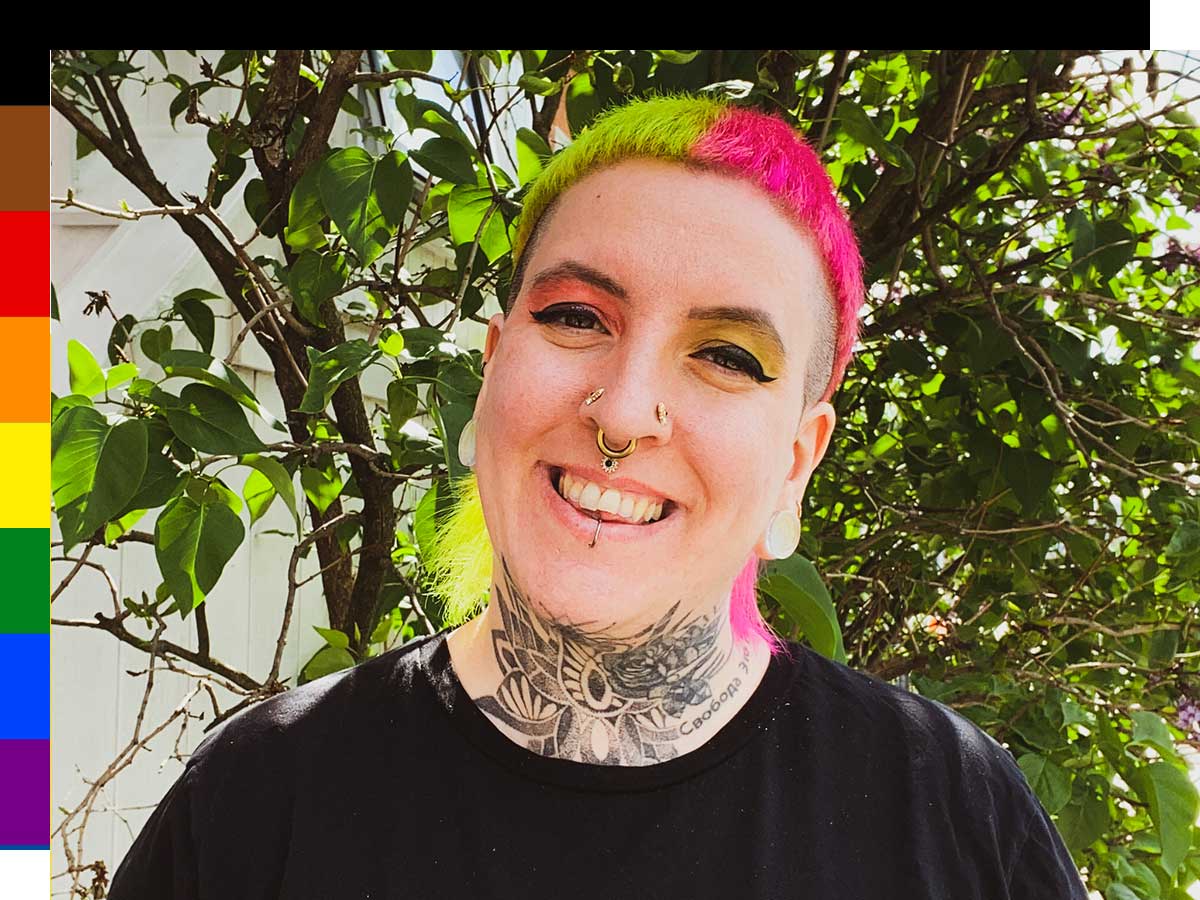
Alysia Myette is a queer fashion designer and educator living and working in the city of Tkaronto (so called Toronto, ON). After graduating from Toronto Metropolitan University (TMU) with a Bachelor of Design in Fashion Design and completing their graduate degree in Fashion as well, Alysia Myette now teaches courses in TMU’s School of Fashion and School of Performance programs. Alysia works to incorporate gender inclusivity into their own practice as well as the classroom and loves all things sparkly.
Your self-titled clothing label aims to decolonize the way 2SLGBTQIA+ bodies are viewed in fashion. How can the industry as a whole break out of societal norms to create a more inclusive, welcoming space for groups historically excluded?
In designing clothing and accessories, I work diligently to ensure my branding and marketing centres inclusivity by eliminating the gender binary and communicating that my designs are meant for all bodies, regardless of size or gender. In the classroom, I love to work with my students to help them reach their goals. Often I teach students from a wide range of economic backgrounds, races and gender/sexual identities. I try as much as I can to show my students local designers who are breaking tradition by championing diversity in their own brands. This can take the form of using models in an inclusive and non-tokenizing way, or directing a portion of their proceeds to mutual aid funds and giving back to their communities. I believe it is important for students studying fashion to understand that the industry is so much more than runways during fashion weeks and that the clothing industry and clothing design can be harnessed as a tool for social change and justice.
You designed the university’s first-ever 2SLGBTQIA+ stoles, which will be available in the fall. What is the significance of this for the students who will wear them, as well as everybody who will see them?
This is such an exciting project to be working on. We started this project in 2020, just before the pandemic started, so it is amazing to see it coming to fruition. Having a 2SLGBTQIA+ stole is a huge step for representation in the community for students at the university. It is a great act of solidarity in that the university is making an effort to showcase their allyship to the community by standing behind students proudly and encouraging them to be themselves and communicate their identities at an event celebrating their academic achievements. Convocation is an incredible ceremony that honours an important milestone in a student's life, and this is a great way to honour those students who proudly self identify. This type of representation not only shows that the university is a safe space where students can be open about their sexual and gender identities but also helps future generations of students recognize this also.
As a lecturer and designer, what do you hope others will take away from your work?
I hope that students recognize me not only as a lecturer but as a facilitator. I often try to work with my students to create a reciprocal learning experience that engages students to be self-reflective about their life experiences, backgrounds and identities when positioning themselves in their projects and as they approach their careers. I do this by being transparent about my own experiences as a queer individual, as a slow fashion designer and as a graduate from the same program. This often shows students a level of relatability and humanizes me as an instructor but also enables students to see the many diverse paths a degree in fashion can offer them.
What does Pride mean to you?
Pride is political. It is a time to celebrate the accomplishments community organization and activism have achieved and reflect on the work that still needs to be done. Pride unites the 2SLGBTQIA+ community to come together to celebrate and invites individuals who are seeking community as well as allies to join in this celebration. It is a colourful, inclusive and diverse range of events that centres our identities and the issues we face while providing a platform for us to speak up and out about who we are, our needs and our dreams. Most importantly, Pride is celebrated annually for a month by many, but - for many who are part of the 2SLGBTQIA+ community — Pride is all year round. In existing, resisting, surviving and thriving, I like to think that Pride is every day for me.
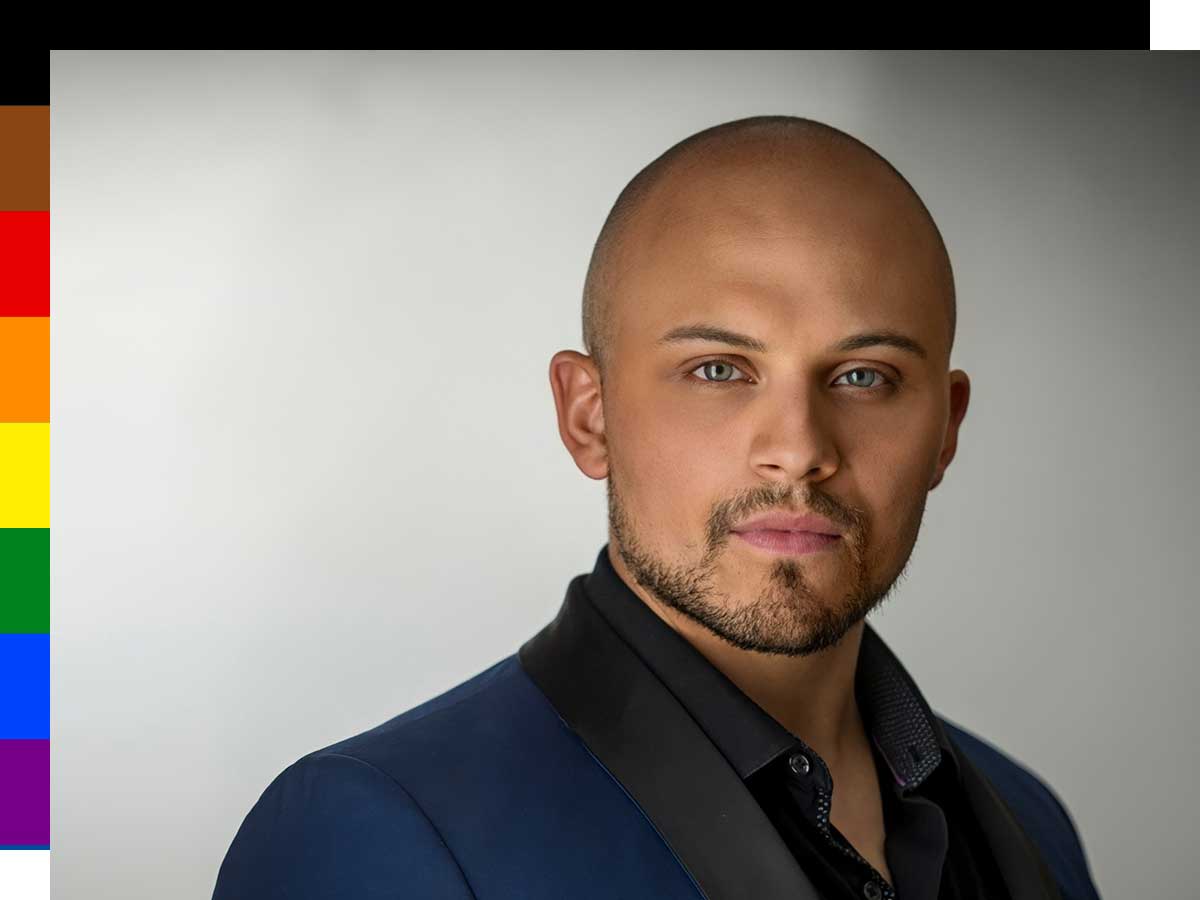
Photo by David Leyes
Mixed media artist and 2014 graduate of TMU's School of Performance, Haui's art is diverse, ranging between directing (stage and screen), designing (video projections and visual arts), and devising (performing, producing, poetry, playwriting) in theatre, opera and film. His works explore themes of race, gender, and orientation, sharing stories often relegated to the peripheries of history. Career highlights include MixedUp, Haui's award-winning feature debut produced with Jack Fox and OutTV. His upcoming opus is a Black opera supported by the Ontario Arts Council, Canada Council and the Canadian Opera Company.
The pandemic halted your plans to work at Stratford, but you're one of many alumni returning! What are you most excited about this season?
I'm excited to be working on a brand new project at Stratford this year, Hamlet 911 (external link) by queer writer Anne Marie Macdonald, which will premiere at the Studio Theatre in the 2022 Season. My husband and TMU graduate, Peter Hinton, premiered his epic trilogy The Swanne at the Studio Theatre during its first season 19 years ago. There is a poetry to being at that same festival almost two decades after his show opened in that space, in an effort to explore new works. It is so vital as younger artists to know the artists who have come before us. We cannot forget those who have paved the way for us.
The arts sector has a powerful role to play as a catalyst for change in society. How have you embraced this and has it influenced the choices you’ve made in your career?
Change is such a key part of growing as humans. Resisting change has never been my instinct. I know this has given me a virtuosity and dexterity of skill. It has definitely influenced my trajectory and the choices I've made in my creative journey. I love the ability to work between different mediums. The art forms I am involved with — film, theatre, opera and visual arts — all contribute to my work. Since beginning work with Wildseed Centre for Arts and Activism, my work has found a new depth for tapping into stories that demand we make lasting cultural shifts.
To create as much as you do, you must devote a great deal of heart to your projects. How has doing what you love provided you an opportunity to explore your own identity?
Every piece I create or am invited to participate in leaves a bit of my heart behind. More of my identity is exposed to the world with every new exploration. I think my last film, MixedUp (external link) , was such a deep dive into my identity that I discovered something. As I move forward I feel my curiosity for others and the world around me will take precedence. It took three decades for me to just begin to scratch the surface of who I am. Through my work, I am able to embrace a cathartic exploration of myself and others.
What does Pride mean to you?
Many are indoctrinated to believe that pride is not a good quality. Pride is something I'm learning to make space for. It is something I don't permit myself to experience. I think as artists, there is such a balancing act between being open and vulnerable and feeling confidence in ourselves. As queer people, we spend so much time hiding parts of ourselves to fit into society. In adulthood, many of us are faced with examining who we are authentically. Pride is new for many of us, partly due to the history of shame in our community. I think queer people can take more time to feel confidence and self-worth. We lost a generation of mentors to the AIDS epidemic, which took far too many lives too soon. We must hold those we lost as emblems who lived their lives in the face of extreme adversity. I cannot thank them enough for allowing me to just be. To answer your question in the simplest way, Pride is something we can afford to give ourselves more of. What we do as diverse, queer folx, and particularly 2SLGBTQIA+ creators, is difficult, raw and exposing.
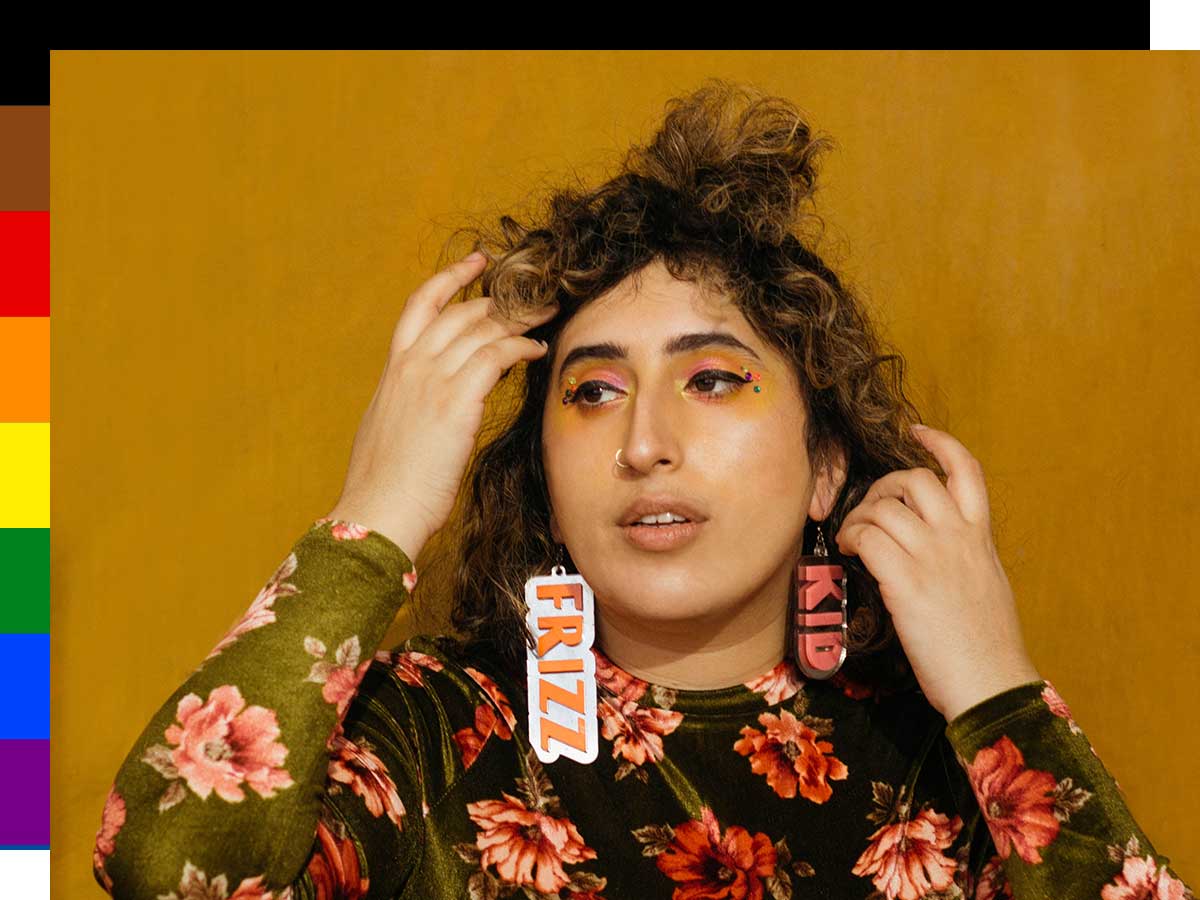
Photo by Bali Singh
Hana Shafi is a writer and artist who illustrates under the name Frizz Kid. Both her visual art and writing frequently explore themes such as feminism, body politics, racism, and pop culture. She’s published articles in The Walrus, Hazlitt and This Magazine, and has been featured on Buzzfeed, CBC, Flare Magazine, New York Times, and Shameless. She is also the 2017 recipient of the Women Who Inspire Award, from the Canadian Council for Muslim Women. Her first book, It Begins With The Body was selected by CBC books as one of the best poetry books of 2018. Her second book, a compilation of essays and illustrations from her notable affirmation art series, titled Small, Broke, and Kind of Dirty, is in stores now.
You use your illustrations and poetry as a way to advocate for social justice issues. What inspired you to begin creating art as a means to reach people?
I think art has always been a way for me to communicate with others. It feels very natural to me, so it’s hard to really pinpoint a beginning or moment that inspired it. It sounds strange, but it’s just something I always felt I was meant to do.
What have you discovered about yourself through creating your art/poetry and what does its popularity tell you about the way others are made to feel in society?
My art, both visual art and writing, has helped me find my most authentic self. Growing up, I felt at times I was trying out different personas, going through different phases—I think that’s a pretty natural part of being a kid. But art is truly an exploration of the self for the artist, and I found very tender and vulnerable parts of myself. The way others have reacted to it shows me that when you are unapologetically yourself, others will have genuine appreciation for that authenticity and strive to be truly themselves too. It’s also shown me that people are looking for kindness and validation in a society that is often harsh, competitive, and sometimes just plain cruel. My art has been a way to engage with the softest, weirdest, and most delicate parts of myself and in others.
Joy and mental health are a big part of your book, Small, Broke, and Kind of Dirty. What advice or encouragement would you share with someone who may be struggling with their identity as a member of the queer community.
The queer community is often represented through narratives of struggle and tragedy. It’s true that the history of the 2SLGBTQIA+ movement has been one that has seen a lot of loss, brutality, and exclusion. But within the queer community, there is also immense joy. We’ve shown that family is who you choose, and coming together as a community makes us safe, strong, and truly joyful. Your struggle with your identity may be an ongoing struggle in life—I won’t try to sanitize that struggle by simply saying it gets better—but with community, these burdens feel much lighter.
What does Pride mean to you?
Pride, to me, means resistance, means rebellion, means prison and police abolition, means climate justice, means affordable housing, means workers rights, means bodily autonomy, means celebration and love, and so much more. Rights for the 2SLGBTQIA+ community is not an issue that exists in a vacuum—it is connected to broader issues, and dismantling all systems of oppression. There is no Pride without also being anti-racist and anti-fascist. No Pride without thinking about the struggles of all people who are pushed to the margins of society. Pride is a protest as much as it's a party, if not more.
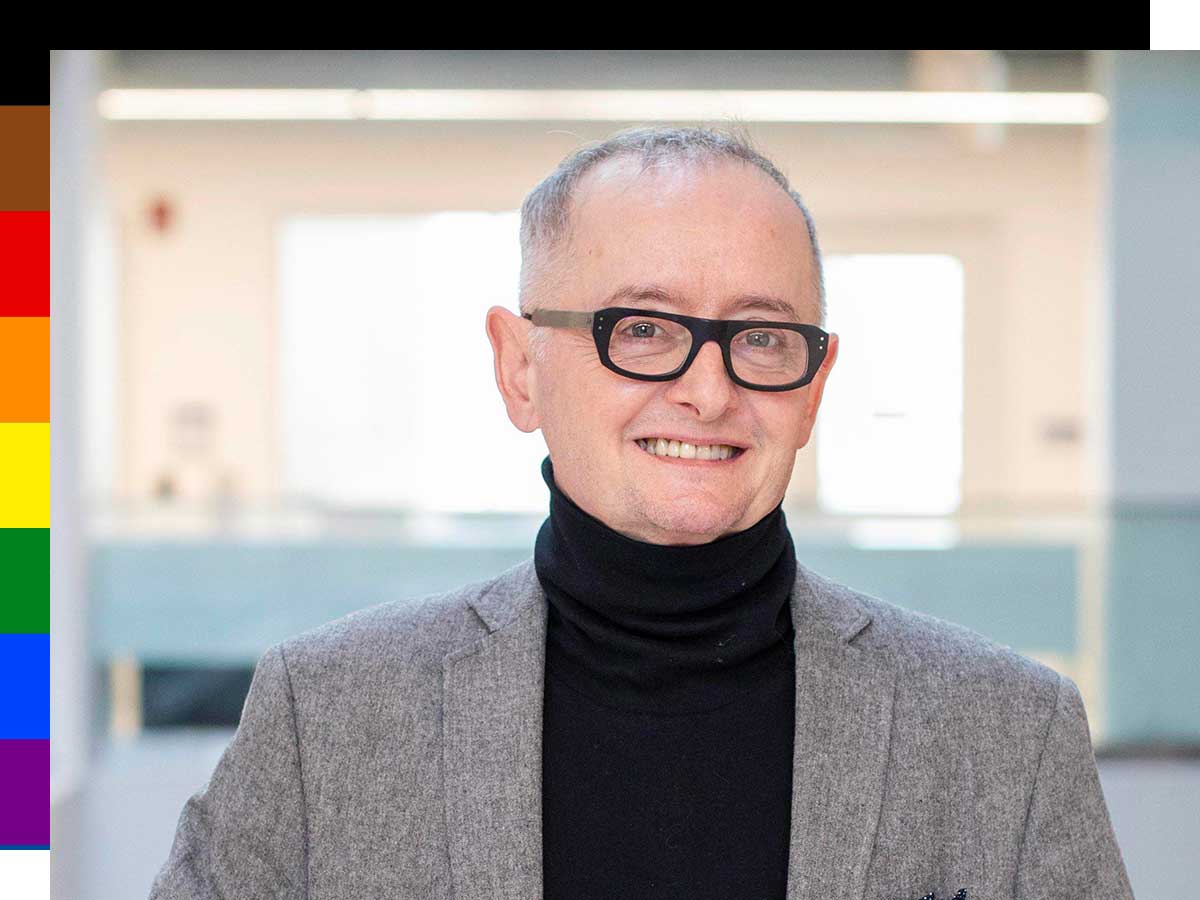
Art Blake is a professor in the Department of History and has been at Toronto Metropolitan University since 2007. He is a historian of the United States and teaches courses in US history, queer and trans history, and urban history. Art also teaches and supervises MA and PhD students in the Program in Communication and Culture. Originally from England, Art earned his BA in American Studies at the University of Sussex. Before starting his PhD in the US, he worked in documentary television and in policy studies in the US and UK. His research revolves around issues of belonging in contexts of racial and other forms of difference. He has published two books and various articles and is currently writing about support networks among self-described male “crossdressers” in the UK and US from the 1960s to the 1980s.
You were the first ECI Faculty Chair and now lead the university’s Dimensions Pilot Program. What does it mean to you to be at the helm of such important work at TMU?
I am grateful for these opportunities and have worked hard to produce positive impacts in both roles while also teaching and remaining active as a researcher. As a queer trans man, and as a person who has been involved in social justice activities since I was a teenager, these roles allow me to bring my varied lived experiences (from the UK, US and Canada) into new equity leadership work in post-secondary education. It is especially meaningful to do this work at TMU during a time of reckoning with our colonial past and present via the Standing Strong Task Force’s report, and in alignment with the work of the Anti-Black Racism faculty, staff and student working groups.
Much of your work is centred around instilling an inclusive culture on campus. What impact do you hope your work will have on the lives of students?
I hope my work contributes to building and sustaining a learning environment for students in which they see themselves reflected in the teaching, research, and creative activities at TMU. I want them to feel at home, to feel they are invited into and can thrive in those activities. I want them to experience the university truly living up to its public commitments to equity.
Recently you proposed two new courses, one on 2SLGBTQIA+ histories and another on trans histories. Why is it important that students have access to these courses?
These courses, open to all students, are vital learning opportunities for students who identify as part of, or are exploring their connections to, the 2SLGBTQIA+ communities because they provide a sense of historic kinship that builds resilience and pride in the present. For students outside the 2SLGBTQIA+ communities the courses provide a depth of knowledge to what they may see as contemporary issues. Students need access to these courses because they centre the historic connections between misogyny, racism, and colonialism in the production of stigma attached to gay, lesbian, queer, bi, trans and non-binary identities.
What does Pride mean to you?
For me, Pride celebrations mark another year of survival, another year of resistance to historic and current attempts to silence, hide, destroy, intimidate, or ignore queer and trans people. Our continued survival is a cause for joy and our continued subjection to violence and marginalization is a cause for anger. Pride is our expression of both.